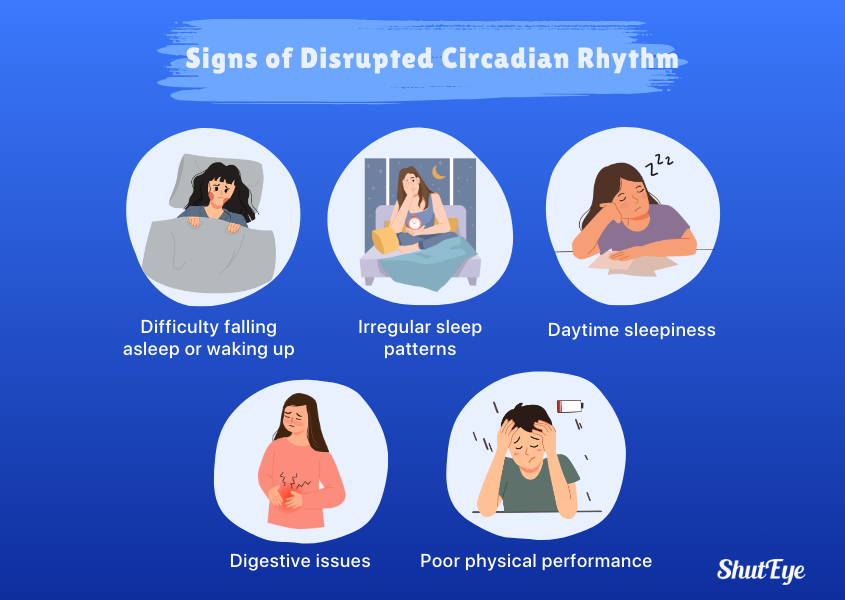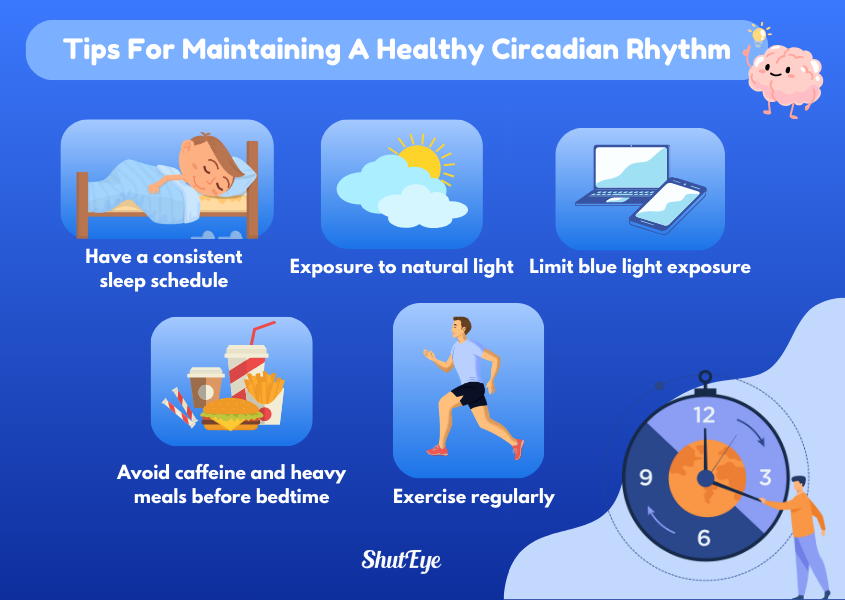


It is important for us, as humans, to get a good amount of sleep each night to function properly. We are able to sleep and wake each time because of our body’s internal clock, also known as circadian rhythm.
But, what exactly is it and how does it work to regulate our sleep-wake cycle, body temperature, and much more? In this article, we will discuss it in more detail.
Circadian rhythm can be defined as the 24-hour internal clock that is located in our brain [1]. It is located within a tiny cluster of cells called the suprachiasmatic nucleus (SCN). It controls when we feel alert or sleepy based on the light-dark cycle or light changes in the environment. It also sends a signal to produce melatonin so that we can fall asleep at night.
The circadian clock helps us to adapt to any changes in our surroundings and respond appropriately to any changes in temperature, eating habits, and digestion.
Related content:
The way that the circadian rhythm works starts from the suprachiasmatic nucleus (SCN) in the brain. As the body follows the light and dark hours, it will send signals to one of the brain pathways.
During the light cycle, your eyes captures changes in the environment. From there, it sends signals to various cells in the brain such that it does not release melatonin. At night, it does the same with the only exception being melatonin production. Melatonin is produced as the brain registers that it is night and it is time to sleep [1].
To simply put, the circadian rhythm is important because it affects sleep. When it falls out of sync so will our sleep. Without proper signals sent to our brain, our body will not know when it should be asleep or awake.
In the past, humans were exposed to minimal light at night. However, with technological advancements, it introduced new sources of light. The most common light source that leads to disrupted circadian rhythms are electronic devices. This is due to excessive blue light emission.
Besides this, some other causes include:
Here are some common signs and symptoms:

If you find that you are unable to fall asleep, slept poorly or are not able to go back to sleep after waking, it may be a sign of circadian rhythm disorder.
Circadian rhythm disorders are disruptions to a person’s circadian rhythm. These are the most common circadian rhythm sleep disorders:
As our circadian clocks are disrupted, it can affect the sleep cycle. This, in turn, affects our health. Some of the health implications include:
Since we know that a disrupted circadian rhythm can lead to various health implications, it is best to regulate and maintain a healthy circadian rhythm.
According to studies, there is a possible correlation between a healthy circadian rhythm and our physical, mental and emotional well-being.
Some of the benefits of regulating your circadian rhythm:

To ensure that your sleep-wake cycle is synchronized with your circadian rhythm, you should practice good sleep hygiene. Here are a list of tips to help you get started:
Having trouble falling asleep and dealing with daytime sleepiness can be frustrating. Fortunately, there are ways to reset and fix your sleep schedule.
The fact is that sleep is important for our health. Our biological clocks plays an important role in maintaining healthy sleep cycles. Without this, the way that our body functions would be impacted. So, let us work our way towards getting better sleep each night!
Davis, L. K., Bumgarner, J. R., Nelson, R. J., & Fonken, L. K. (2023). Health Effects of Disrupted Circadian Rhythms by Artificial Light at Night. Policy Insights from the Behavioral and Brain Sciences, 10(2), 229-236. https://doi.org/10.1177/23727322231193967
National Institute of General Medicine (2023) Circadian Rhythms [online]. https://www.nigms.nih.gov/education/fact-sheets/Pages/circadian-rhythms
Reddy S, Reddy V, Sharma S. Physiology, Circadian Rhythm. [Updated 2023 May 1]. In: StatPearls [Internet]. Treasure Island (FL): StatPearls Publishing; 2024 Jan-. Available from: https://www.ncbi.nlm.nih.gov/books/NBK519507/